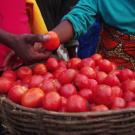Success Story: Competition advances postharvest innovation
Engaging start-ups to reduce postharvest losses in Rwanda
With nearly half of all fruits and vegetables wasted before they can be eaten, reducing losses of fresh produce after harvest requires systematic change. Simple interventions related to postharvest handling can have an impact, but no single isolated intervention will prove effective at mitigating this issue.
An international team supported by the Feed the Future Innovation Lab for Horticulture is taking a systems approach to reducing postharvest losses in Rwanda, beginning by understanding the problem, laying the groundwork for improvements, and perhaps most importantly engaging entrepreneurs and industry in leading the way for lasting solutions.
Led by Agribusiness Associates with guidance from Rwanda’s Ministry of Agriculture and Animal Resources, the team has analyzed the problem of postharvest losses in Rwandan horticulture across four different value chains: green chili peppers for export; tomatoes for regional domestic markets; sweet potatoes for local markets; and green bananas for local markets. Published this year, the reports combine a value chain analysis with a commodity systems assessment methodology to evaluate postharvest losses.
The team also established three Postharvest Training and Services Centers, each hosted by a key organization in Rwanda’s horticulture industry. One center is located at the University of Rwanda in Busugo, another center is hosted by the Rwanda Agriculture Board in Rubona, and a third is part of the National Agricultural Export Development Board at Mulindi. Each of the centers is equipped with postharvest technologies and run by knowledgeable partners who can share improved postharvest practices with nearby farmers and agricultural businesses.
With postharvest tools now available, the team launched the Rwanda Postharvest Innovation Competition to provide postharvest entrepreneurs with seed funding and skills to start profitable businesses that reduce postharvest losses.
The competition culminated in the firstever “Rwanda Postharvest Week,” in Kigali, which included a conference attended by 100 people, a two-day postharvest training for agronomists and farming cooperative leaders, and a graduation workshop for 33 new postharvest trainers after a year-long e-learning course — in addition to the announcement of the competition winners.
Competition participants ranged from innovators with a prototype, to businesses that have already introduced a product to the market and are ready to accelerate growth. Over the course of two months, participants attended an agribusiness development training, polished a persuasive “pitch deck” slideshow, and submitted financial projections for their enterprise. Innovations were judged based on their economic opportunity, value to customers, place in the value chain and financial sustainability.
The competition’s winning projects ran the gamut from a cold storage service provider to the makers of a traditional chili sauce, tree tomato jam and pumpkin oil.
Winners of the competition were 13 burgeoning enterprises that received a cumulative total of $50,000 (44,054,000 Rwandan francs) in seed funding for their postharvest technologies and start-up businesses.
Through the competition, entrepreneurs learned how to combine their business savvy to extend innovative solutions in the postharvest sector, creating value in crops that might otherwise be lost or wasted. By engaging entrepreneurs, this Horticulture Innovation Lab team is seeding sustainable change in Rwanda’s horticulture industry.

